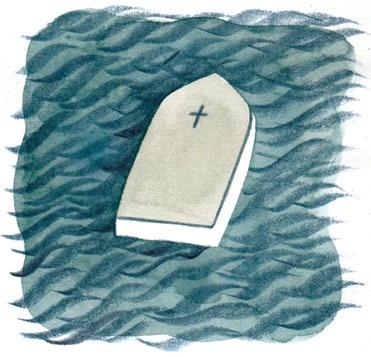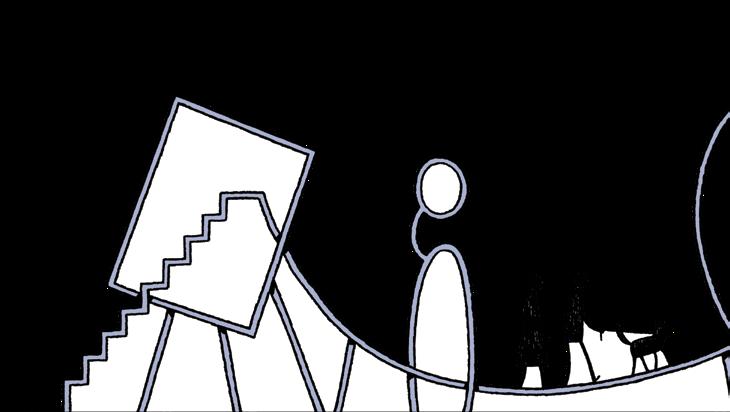
4 minute read
Postcards from the Edge
Pray for those in peril on the sea
Mary Kenny admires the Dover Christians helping migrants who cross the Channel in frail dinghies
Advertisement
It’s understandable that there’s so much concern about the record number of migrants and asylum seekers who have crossed the Channel this year. By July this year, the numbers had reached over 9,000 – more than in the whole of 2020.
Yet I consider it a compliment to this country that so many migrants want to come to Britain. They have paid large sums with their life savings to make the journey, in frail dinghies. I doubt that most are motivated by benefits and free housing – migrants are often ambitious people, who seek work and a better life.
The strenuous efforts they have made to embark on the journey amount to a kind of Darwinian survival test.
People may blame the French for not controlling the flow, or the government authorities for not regulating the system properly. But some Brits have genuine compassion for those who risk their lives, and sometimes their children’s lives too, to get to these shores.
At Dover seafront, near the East Docks, there is a poignant memorial stone: ‘In memory of the many victims who have lost their lives seeking sanctuary in the UK,’ with a quote from Pope Francis: ‘Every migrant has a name, a face and a story.’ (There is also a wall memorial remembering the 58 young Chinese people who were found dead in a lorry nearby, having just crossed the Channel on 18th June 2000.)
These were erected by a local faith group of Catholics and Anglicans, called Seeking Sanctuary, who are advocates of help for migrants. It was launched six years ago by a Deal councillor, Ben Bano. Ben says that the Dover church parishes – although in a Brexit constituency – have been very supportive. ‘Most people understand that it’s an issue of humanity.’
The demography of migration seems to me to be inevitable. Developed western societies have low fertility and are short of workers: poorer, war-torn nations have high birth rates and are willing to take almost any risk to find a better life.
We have all learned a lot from the long experience of COVID lockdowns, and evidently a lot of people have learned to drink more liquor. British deaths from the demon drink hit a record rate of 7,423; a 20-per-cent increase on the previous year. The tally for 2021 is expected to be higher.
This is a subject on which I could write a PhD thesis, suggesting that the Rev Ian Paisley wasn’t entirely wrong in dubbing alcohol ‘the devil’s buttermilk’. The booze nearly drove me demented, and familial proximity to the problem is the greatest burden of my life. I know so many stories about death, and self-destruction, by alcohol. Yet we used to joke about it – ‘Brahms and Liszt’!
When you come to realise what wretched problems are caused by indulgence in the bevvies, you start to understand why all those fiery Methodists waged war against the depredations of Gin Lane. And why American feminists led the introduction of Prohibition – their strategies including taking an axe to the local tavern.
I have seen two striking, classic films about the dangers of the bottle: one is Leaving Las Vegas, a despairing chronicle directed by Mike Figgis in 1995, and starring Nicholas Cage. It features a screenwriter who deliberately drinks himself to death, and it’s starkly comfortless. The other is Billy Wilder’s 1945 The Lost Weekend, with Ray Milland. It depicts the despair and torment, and also the ruthlessness and cunning, of the dipso state (it also depicts Jane Wyman – aka Mrs Ronald Reagan I – in a stunning leopard-skin coat).
A sunnier Danish drinking movie, Another Round, came out earlier this summer, making the pitch that Churchill won the war on liquor, and boozing together bonds friendships.
Elderflower spritzer does the job just as well!
I see that full-on Brexiteers want to revert to imperial measures for everything, replacing litres and metres with pints and yards. Surely there’s space for a mix-and-match approach?
In Ireland, metric is official, and distances given in kilometres, but people still talk about miles, and chaps being six feet tall. Newborn babies still come in pounds, and dieters still hope to lose stones. The human mind can easily run on parallel tracks.
Caroline Nokes, Conservative MP for Romsey and Southampton North, 49, says that almost every woman she knows has received unwanted sexual attention from men. She was appalled when a man approached her and said, ‘You’re stunningly beautiful – can I take you out for a drink?’ Some of us would have been thrilled.
Time changes all perceptions, and eventually Ms Nokes will come to appreciate Dorothy Parker’s rueful observations on the subject of male attitudes: ‘Some men break your heart in two/Some men fawn and flatter/Some men never look at you/And that cleans up the matter.’ So, so true!











